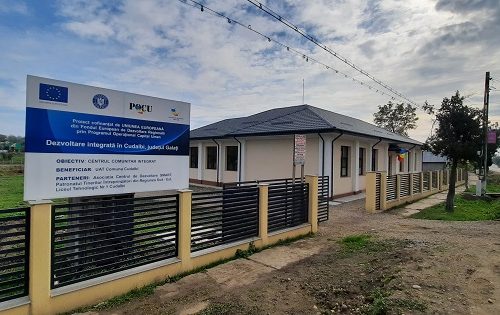Moderated the works of the Central European Initiative Youth Forum in Bucharest
During October 19-22, 2009, the Romanian Presidency of the Central European Initiative (CEI) hosted The 9th CEI Youth Forum, Supporting Youth Access on Labor Markets.
The CEI was established in 1989 as an intergovernmental forum for political, economic and cultural co-operation among its Member States. It is composed of 18 Member States: Albania, Austria, Belarus, Bosnia and Herzegovina, Bulgaria, Croatia, the Czech Republic, Hungary, Italy, Macedonia, Moldova, Montenegro, Poland, Romania, Serbia, Slovakia, Slovenia and Ukraine (Source: www.ceinet.org).
Approximately 60 participants from 18 countries attended the Forum and worked together on a Declaration that tackles needs, obstacles and demands concerning youth access on labor markets. It was adopted in unanimity and is aimed at being considered by the heads of state and government from the member countries at their regular meetings. Here are some demands:
- Policy makers should work together with the young people, consult them and create youth and youth-related policies WITH them and FOR them.
- To improve the quality of services of the local and national employment assistance offices in order to offer flexible and rapid expert evaluation and counseling to young people, as support for their studies, further studies and career decisions.
- To develop national employment programs that specifically focus on young jobseekers, paying attention to those with a low level of education. The aim is to tackle youth unemployment with a combination of training, coaching and work experience.
- To acknowledge the importance of a cross sectorial approach and to implement a multi-level network cooperation between education, youth, labor and other administrative sectors.
- Input of all stakeholders should be taken into account when developing curricula.
- Policy makers should introduce and enhance measures supporting employment of young people (e.g.: tax reductions, subsidies for companies that hire graduates etc.)
- To recognize and support volunteering and non-formal education.
- To encourage public-private partnerships in the process of professional youth training.
- To create a legal framework which regulates the possibility for young people to do internships in public institutions or private companies.
- There should be fiscal and other incentives for young people opening and developing their own businesses.
- To develop a system of monitoring and prognosis of the regional labor market (including information about vacancies, market dynamics, professional re-qualification possibilities, legislation, jobs classification etc).
- To take specific actions focused on the revival of economically disfavored areas and to stimulate young people living in rural areas to remain in the region and develop agricultural activities.
- To stimulate international work mobility within the CEI region for the young people, for example by creating and developing a “Work and Travel” type system at the level of the CEI member states.
- To take special measures concerning the integration on labor market of disadvantaged youth (footnote with definition of disadvantaged youth).
- To develop a network of university career centres, to provide the connection between the education and the job market.
- CEI member states should have a continuous dialogue on the above mentioned issues and turn to peer learning and best practice examples for finding the best ways to deal with them.
The full declaration can be downloaded from http://www.mts.gov.ro/stire/Declaratia_finala_a_Forumului_de_Tineret_al_Initiativei_Central_Europene.
More video clips are available here.





















